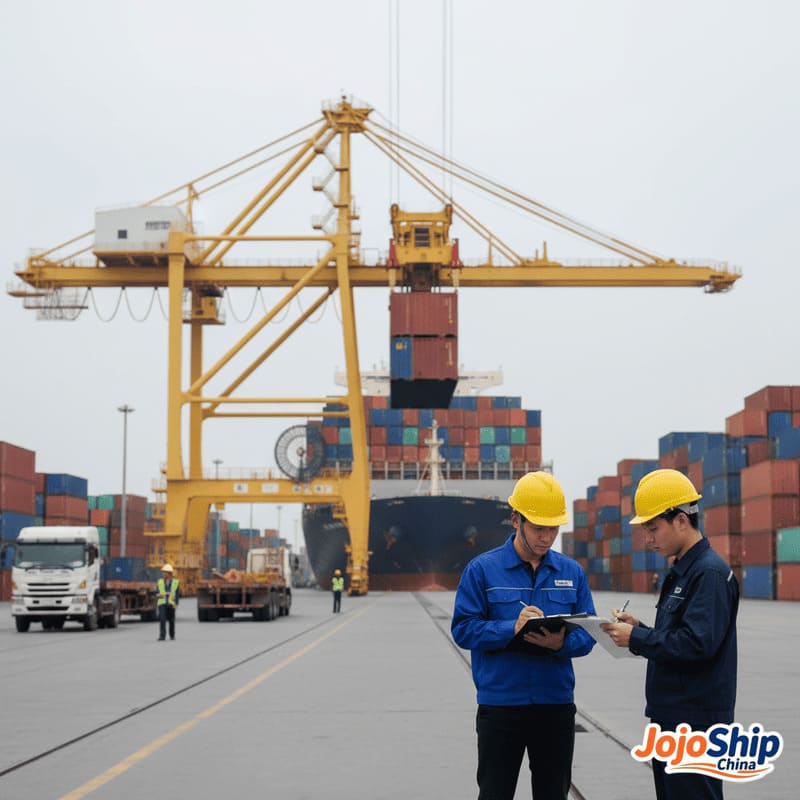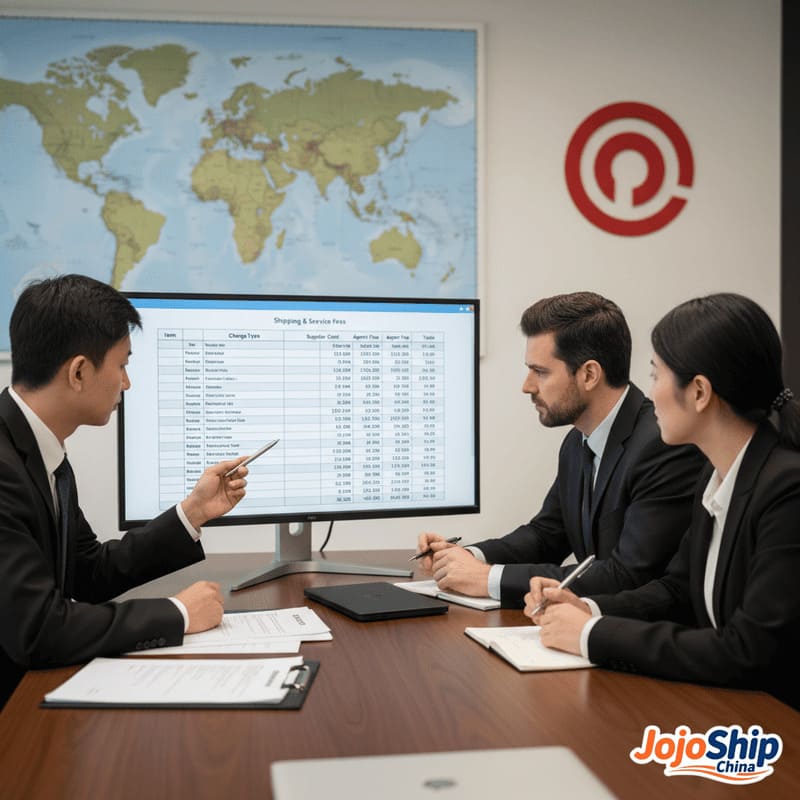Are you struggling with delayed shipments, surprise fees, or customs holds? Are communication barriers with Chinese suppliers causing logistics nightmares? These common problems often signal the need for a shipping agent.
You need a shipping agent in China if you're regularly importing commercial volumes, dealing with multiple suppliers, require customs expertise, or lack local representation. A shipping agent handles export documentation, coordinates with carriers, secures competitive rates, and resolves logistics problems at the origin.

When I first started helping businesses import from China, I noticed a clear pattern: companies trying to handle logistics themselves often faced preventable problems that cost them time and money. Let me walk you through when a shipping agent becomes essential versus when you might be able to manage without one.
How Much Does a Sourcing Agent Charge in China?
Are you concerned about adding another cost to your supply chain? Wondering if the fees charged by sourcing agents are justified? These are common questions that deserve clear answers.
Sourcing agents in China typically charge 3-10% commission on order value, flat monthly retainers of $500-3,000, or project-based fees ranging from $300-1,500. Some may use hybrid models combining smaller percentages with fixed fees, while specialized services like quality inspection have separate rate structures.

I've seen businesses hesitate to hire agents because of cost concerns, only to end up paying far more fixing problems that an agent would have prevented. Let's break down exactly what you can expect to pay and what value you should receive in return.
Different Fee Models for Chinese Sourcing and Shipping Agents
Understanding the various pricing structures helps you select the most cost-effective option for your specific needs:
| Тип услуги | Fee Structure | Typical Rates | What's Included | Лучшее для |
|---|---|---|---|---|
| Full Sourcing Service | Commission-based | 5-10% of order value | Supplier sourcing, negotiation, QC, shipping coordination | Businesses new to China sourcing |
| Sourcing Agent Retainer | Monthly fee | $700-3,000/month | Dedicated sourcing team, regular factory visits | Ongoing procurement needs |
| Project-Based Sourcing | Fixed fee | $500-2,000/project | One-time supplier identification and vetting | Testing new product categories |
| Shipping Agent Services | Per shipment | $100-500 + freight cost | Export docs, customs clearance, carrier booking | Businesses with established suppliers |
| Quality Inspection | Per inspection | $200-400/day | Factory visits, product testing, compliance checks | Critical quality requirements |
| Factory Audit | Per audit | $600-1,500/audit | Facility assessment, capability verification | New supplier qualification |
| Shipping Consolidation | Volume-based | $50-200 + freight savings | Combining multiple orders into single shipment | Multiple small orders |
These rates can vary significantly based on factors like geographic location (major cities like Shenzhen or Shanghai typically command higher fees), complexity of products, and the agent's expertise level. For example, when I helped a client source complex electronic components, specialized agents charged higher rates than those handling simple textiles because of the technical knowledge required.
I remember working with a client who initially balked at our 7% commission. They decided to try managing the process themselves, only to face a quality disaster that cost them over $20,000 in returns and customer complaints. The savings on agent fees ended up costing them far more in the long run.
For shipping specifically, most agents charge either a flat rate per shipment plus the actual freight cost, or they mark up the freight cost by 10-20%. While this may seem significant, experienced agents often negotiate carrier rates that are 15-30% below what you could secure on your own, potentially resulting in net savings despite their fees.
Some agents also offer tiered pricing that decreases as your volume increases. For instance, they might charge 7% for orders under $10,000, 5% for orders between $10,000-50,000, and 3% for orders above $50,000. This model rewards loyalty and growth, benefiting both parties as your business scales.
Value Beyond the Fee: What Good Agents Deliver
The best way to evaluate an agent's fee is to consider the complete value proposition:
| Value Category | Tangible Benefits | Potential Cost of Not Having This |
|---|---|---|
| Supplier Verification | Preventing fraud and non-performance | Lost deposits, failed orders |
| Контроль качества | Reduced defects, consistent standards | Returns, reputation damage, legal issues |
| Price Negotiation | Lower unit costs, better payment terms | Overpaying 10-30% on products |
| Documentation Management | Compliant paperwork, reduced delays | Customs holds, penalties, extended storage fees |
| Решение проблем | Quick fixes to production or shipping issues | Production delays, missed market opportunities |
| Market Intelligence | Insights on pricing, alternatives, innovations | Competitive disadvantage, missed opportunities |
| Risk Management | Identifying and mitigating potential problems | Business disruption, financial losses |
When I evaluate whether a client needs an agent, I look at both their internal capabilities and their risk exposure. For businesses with high-volume, low-margin products, even small problems can devastate profitability. In these cases, a good agent typically delivers return on investment many times their fee.
Do You Need a Shipping Agent? Key Factors to Consider
Understanding exactly when you need a shipping agent involves evaluating your specific situation against several critical factors:
| Фактор | When You Need an Agent | When You May Not Need One |
|---|---|---|
| Shipment Volume | Regular commercial quantities | Small, occasional personal shipments |
| Complexity | Multiple suppliers or multi-port shipments | Simple point-to-point delivery |
| Supplier Capability | Limited logistics experience or reliability | Full-service supplier with proven logistics track record |
| Product Regulations | Goods requiring specific certifications or handling | Standard items with simple compliance needs |
| Local Presence1 | No company representatives in China | Your own staff or office in China |
| Logistics Expertise2 | Limited understanding of international shipping | In-house logistics team with China experience |
| Time Constraints | Tight delivery deadlines or season-sensitive goods | Flexible timeline with room for delays |
| Budget Concerns | Ability to absorb the added service cost | Extremely tight margins where every fee matters |
| Risk Tolerance | Low tolerance for delays or problems | Willingness to handle issues as they arise |
| Value Chain Position | Direct-to-consumer or time-sensitive retail | B2B with flexible delivery windows |
I've seen these factors play out in real business scenarios countless times. For example, I worked with an e-commerce seller who initially tried managing their own shipping from multiple Chinese suppliers. The coordination challenges led to inconsistent delivery times and confusion about documentation requirements. After bringing in JojoShip China as their shipping agent, their landed costs actually decreased despite our fees because we consolidated shipments and negotiated better carrier rates.
Real Benefits of Using a Shipping Agent
The practical advantages of working with a shipping agent become clear when examining specific logistics challenges:
- Documentation Management
Without an agent, export documentation errors are extremely common. I once helped a client whose previous shipment had been held at customs for three weeks due to incorrect HS codes and missing certificates. Our team created proper documentation templates and verification processes, and their next 12 shipments cleared customs without a single delay.
- Crisis Management
During COVID-related port shutdowns, one of our clients needed urgent medical supplies shipped from Shanghai. With most regular routes disrupted, our local team identified alternative ports and routing options, securing space on a vessel departing from Ningbo instead. Without local expertise, their critical shipment would have been delayed by weeks.
- Cost Optimization
For businesses shipping less than container load (LCL), the savings from cargo consolidation can be substantial. We helped a home goods importer reduce their shipping costs by 35% by consolidating orders from five suppliers into a single container rather than shipping separately.
- Supplier Coordination
When shipping involves multiple pickup points, coordination becomes critical. For a fashion retailer sourcing from seven factories in different cities, our team managed the logistics timing to ensure all goods arrived at the port with proper documentation, preventing costly delays or partial shipments.
- Regulatory Navigation
Export regulations change frequently. When China implemented new wood packaging requirements, many shippers were caught unprepared. Our clients received advance notice and guidance on compliance, while others faced penalties and returns for non-compliant packaging.
When You Might Not Need a Shipping Agent
There are situations where managing without an agent makes sense:
-
If you're working with a large, experienced supplier who offers door-to-door shipping services and has proven reliability, they may effectively serve as your shipping agent.
-
For very small or sample shipments where the administrative cost of an agent would be disproportionate to the shipment value.
-
If you have your own office or staff in China who can manage shipping logistics directly.
-
When shipping standardized products with established procedures and no history of compliance issues.
One client of mine manufactures simple plastic components with a long-term supplier who handles all shipping arrangements. After evaluating their process, I advised them that adding a shipping agent would be redundant since their supplier had a strong logistics team and perfect delivery record.
Making Your Decision: A Practical Framework
To determine if you need a shipping agent in China, ask yourself these key questions:
-
Do I understand all export requirements for my products?
If you're uncertain about documentation, regulatory compliance, or best practices for your specific goods, an agent provides valuable expertise. -
Can I communicate effectively with Chinese logistics providers?
Language barriers and time zone differences can create significant challenges without local representation. -
Do I have backup plans for common shipping problems?
Agents help navigate issues like port congestion, carrier schedule changes, or customs inquiries. -
Is my supply chain optimized for cost and efficiency?
Agents can identify consolidation opportunities, negotiate better rates, and improve routing. -
How would shipping delays impact my business?
If timely delivery is critical to your operations, the risk mitigation an agent provides becomes more valuable.
For most businesses importing regularly from China, the question isn't really "Do I need an agent?" but rather "What specific agent services do I need?" Some may benefit from comprehensive support, while others might need only targeted assistance with specific aspects of shipping.
I've found that the most successful importers take a strategic approach, starting with more comprehensive agent services when beginning to source from China, then gradually internalizing certain functions as they gain experience and confidence in the market.
Заключение
A shipping agent in China is essential for most businesses importing commercial quantities regularly, as they provide expertise in documentation, customs compliance, carrier negotiation, and problem-solving that typically saves more money than their services cost, while preventing the logistics headaches that often plague inexperienced importers.




